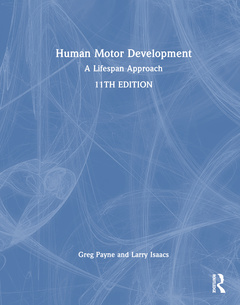Description
Human Motor Development (11th Ed.)
A Lifespan Approach
Authors: Payne V. Gregory, Isaacs Larry D.
Language: English
Subjects for Human Motor Development:
· 20.3x25.4 cm · Hardback
Description
/li>Contents
/li>Readership
/li>Biography
/li>
Human Motor Development: A Lifespan Approach, 11th Edition, provides an overview of the academic field of study known as human motor development, the examination of lifelong changes in human movement. The book uses a holistic approach and emphasizes the importance of intellectual, social, and physical development and their impact on human motor development at all ages. The unique approach of this book includes the relationships between motor development and critical interactions with cognitive, social, and physical changes across the lifespan.
Organized into five parts, the book examines key topics in motor development including the relationship between cognitive and social development and motor development, factors affecting development, changes across the lifespan, and assessment in motor development with special attention being applied to adulthood and older adulthood given the dramatically increasing numbers of people in those age groups worldwide. Each chapter includes chapter objectives, a summary, a list of key concepts, questions for reflection, a list of related online resources and an extensive reference list.
Highly illustrated and written for student accessibility providing access to a fully updated companion website, which includes laboratory exercises, an instructors? manual, a test bank, and lecture slides, Human Motor Development: A Lifespan Approach is essential reading for students of motor control and development, kinesiology, human performance, and students interested in physical therapy, physical education, and exercise science.
Part I
1. Introduction to Motor Development
2. Cognitive and Motor Development
3. Social and Motor Development
Part II
4. Prenatal Development Factors
5. Effects of Early Stimulation and Deprivation
Part III
6. Growth and Maturation
7. Physiological Changes: Health-Related Physical Fitness
8. Movement and the Changing Senses
Part IV
9. Infant Reflexes and Stereotypies
10. Voluntary Movements of Infancy
11. Fine Motor Development
12. Fundamental Locomotion Skills of Childhood
13. Fundamental Object-Control Skills of Childhood
14. Youth Sports
15. Movement in Adulthood
Part V
16. Assessment
Index
V. Gregory Payne is Professor Emeritus of Kinesiology at San Jose State University. He formerly served as the Associate Dean for Research in the College of Applied Sciences and Arts and as Chair of the Department of Kinesiology. Payne is a motor development specialist who received a BS degree from Western Illinois University and received that institution’s Distinguished Alumni Award. He earned an MA from the University of Iowa and his PED from Indiana University. Payne worked for the Venezuelan Ministry of Education as a Peace Corps Volunteer following college. Payne was an International Professor of the Year at SJSU, received the Distinguished Service Award from the California Governor’s Council on Physical Fitness and Sports and the prestigious Research Quarterly for Exercise and Sport Research Writing Award. He has held offices in several organizations including NASPE President and Chair of the Motor Development Academy. He is an elected Fellow of the National Academy of Kinesiology and the Research Consortium of AAHPERD/SHAPE America, has chaired two editorial boards, and has reviewed for many journals. He was a member of the task force that developed the NASPE National Physical Education Standards. Payne lives in San Jose, California, with his wife, Linda, and their dog Jake who is a mature runner, jumper, and catcher (frisbee specialist).
Larry D. Isaacs is Professor Emeritus and former Director of the Exercise Physiology Program, Department of Biological Sciences, at Wright State University. Isaacs received both his BS and MS degrees from Virginia Commonwealth University, where he specialized in human motor development while developing a strong interest in human and exercise physiology. Following four years of public school teaching, Isaacs attended the University of Maryland receiving his doctorate in 1979. He continues to serve as a reviewer for many scholarly journals. He is certified with the American College of Sports Medicine (Ce




